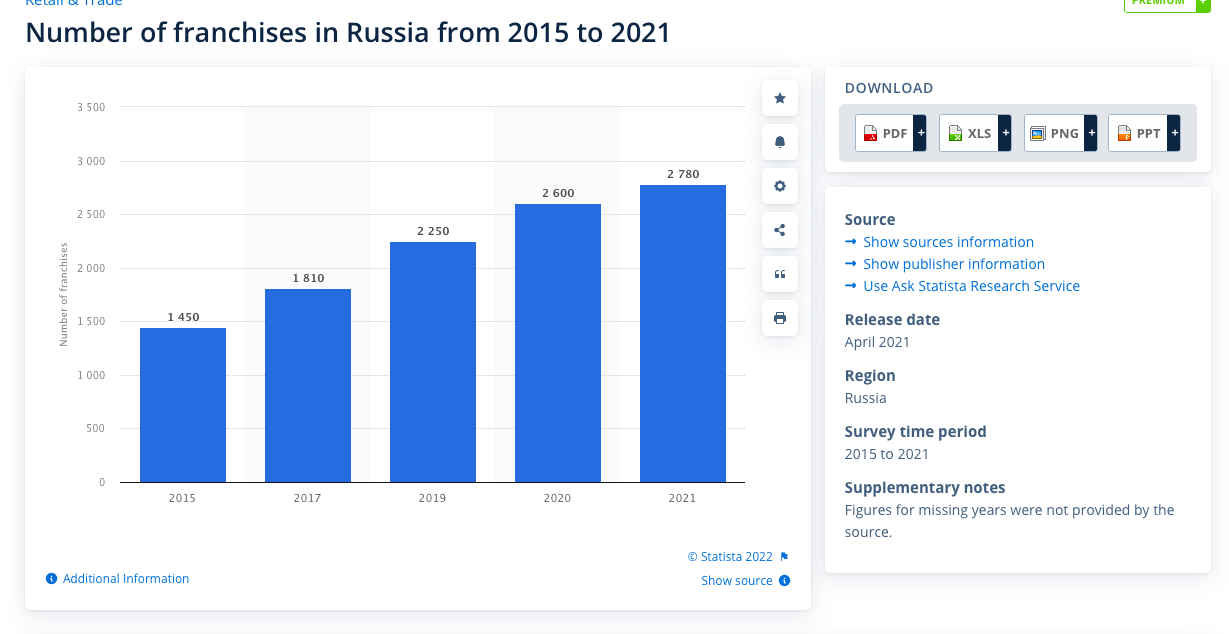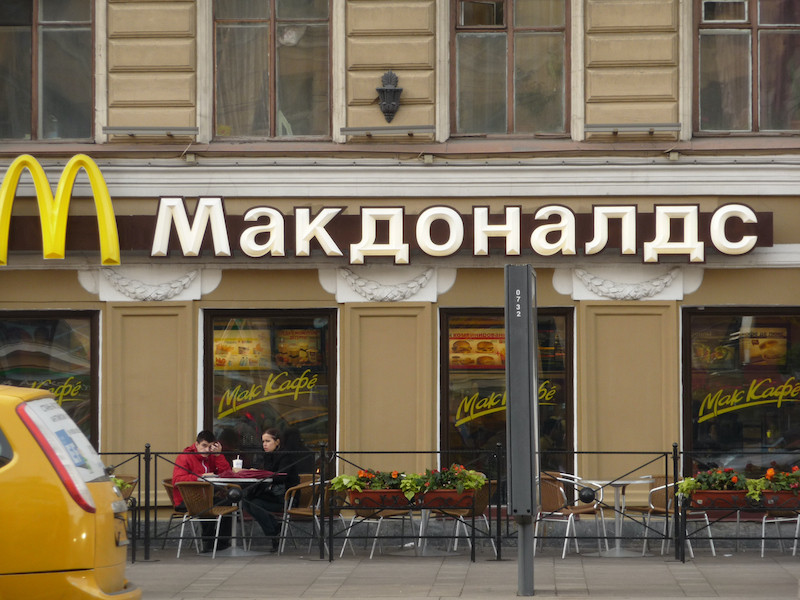A series of American and Western brands such as Subway Russia, McDonald’s, KFC, Taco Bell, Pizza Hut have announced their withdrawal from Russia. Is this said to be even possible? Answering this question sheds light on other aspects of franchise and global expansion through this transcendent business model.
1. A Series Of World Famous Brands Announcing Withdrawal From The Russian Market
The list of famous American and Western brands is getting longer and longer, full of big names, such as Kodak, Subway, Burger King, KFC, McDonald’s, Hyatt and Hilton. The way these famous brands are present in Russia is done through the traditional and extremely effective method: Franchise.
The reasons stated by the parties are often associated with protecting the reputation of the brand due to the war in Ukraine. To see how this affects Russia, it is necessary to evaluate how franchising is contributing value to the Russian economy.
2. Scale of Franchise in Russia
Currently, Russia occupies a leading position in the world ranking of the growth rate of the number of franchising companies. Russia has about 2780 franchisors (Statista 2022) and more than 50,000 franchisees. In terms of franchising points last year, Russia led Germany with 74.6 thousand points. In the context of the changing Russian economy, franchising continues to be one of the most promising forms of business in Russia. The turnover of the franchising market in Russia accounts for a significant part of the country’s GDP, in 2017 the figure amounted to more than 3.5% (source: Franchise world link).
Thus, it can be said that the withdrawal of famous brands from the Russian market will greatly affect the Russian economy.

3. What is the Essence of Franchising?
The essence is that the party holding the right to a business model allows another party to exploit and use that business model through a franchise contract. In which, the franchisor will hold almost absolute control over the Franchisee. The method of developing a franchise model usually has two methods:
- The franchisor himself finds the parties who want to receive the franchise and signs a contract directly;
- The franchisor signs a master franchise with a developer of the franchise model. From there, the Master Franchise contract holder will sign on behalf of the franchisor with the parties wishing to receive the franchise, instead of letting the franchise owner actually sign with the party wishing to sub-franchise the business model.
4. How do American and Western Famous Brands Appear in Russia?
Currently, famous brands appear in Russia through both Method 1 and Method 2 mentioned above. So, there will be a lot of legal issues as to whether these brands can lawfully withdraw from Russia or not? Which will be controversial.
- In Method 1, the parent company is still located abroad, and the representative of the parent company in Russia will work on behalf of the partners here. For example, under this principle, the American company Subway Russia, with its headquarters in Nevada, sells its business rights. All decisions regarding the granting of a franchise are made by the US office and royalty fees are deposited into the same account monthly. Russian subway franchisees also receive the necessary equipment and materials from the United States.
- In Method 2, the foreign company sells the exclusive franchise rights to a Russian company (Master franchise). Accordingly, this Russian company will be responsible for implementing franchising on the territory of Russia, conducting training for employees of partner companies, controlling their work, and receiving royalty fees from them. A certain amount of payment will then be transferred to the original franchisor. An example of this model is the Kodak franchise in Russia.
- Another Method: the foreign company sells master franchise to a company located in another independent country, not related to the US or Russia. From there, this company will sub-franchise to companies in Russia.
5. Situation of Famous Brands After the Announcement of Withdrawal from Russia
Hundreds of US companies in various industries have stopped doing business in Russia amid diplomatic and social sanctions boycotting the country. But some iconic American brands are still serving customers there despite public pressure to force them to close their stores.
McDonald’s, initially refused to suspend operations in Russia, then under pressure and had to announce on March 8 it would temporarily close all 850 locations in Russia, marking an unprecedented change after 32 years of operation in this country. Meanwhile, many Burger King, KFC, Papa John’s, and Subway stores remain open. So do Marriott, Hyatt, and Hilton hotels.
6. Legal Resistance, The Power of Franchise Contracts
One of the main reasons is the legal structure with which these companies operate branches in Russia. McDonald’s directly owns 84% of its restaurants in Russia, while the rest is owned by other franchisees. In contrast, RBI, which owns Burger King, operates all 800 Burger King stores in Russia through an exclusive Russian franchisee, which specializes in recruiting local franchisees. The restaurant group said it was not feasible to close all locations immediately because they had franchise agreements that “didn’t change easily”.
Yum Brands, the parent company of KFC, Taco Bell, and Pizza Hut, is in a similar situation. Yum Brands has temporarily closed 70 company-owned KFCs across Russia. But nearly 1,000 KFC stores are owned by exclusive franchisees and 50 Pizza Hut stores are still open. Yum Brands said in a statement on March 10 that it was finalizing an agreement with its main franchisee to suspend Pizza Hut operations in Russia.
Both restaurant groups said they had suspended new investments and any corporate support for the Russian market. Papa Johns, which owns 186 restaurants in Russia through a major franchisee, made a similar announcement. Subway, which owns about 450 locations in Russia through local franchisors, said it would provide humanitarian assistance to Ukrainian refugees but had no plans to close restaurants.
Hotel chains Marriott, Hyatt and Hilton have all halted new developments and closed corporate offices in Russia. But many of their branded hotels are still operating because these companies do not have direct ownership. Marriott said its Russian hotels are owned by third parties and it is “evaluating the possibility” of these hotels remaining open. Hyatt and Hilton hotels in Russia are also owned by local investors, according to real estate news site The Real Deal.
7. Unilateral Termination Clause in Franchise Contract
The original owners of the American and western brands made a unilateral declaration to terminate the franchise agreement. However, if you look at the terms of the franchise agreement, there is no such provision. Whether these owners cite Force Majeure as war or invoke a clause they frequently include in their franchise agreements with other countries that are prohibited franchisees US fortune: “Franchisee and/or an Owner fails to comply with Anti-Terrorism Laws or become listed on the Annex to Executive Order 13244;”.
Although Russian law allows the parties to unilaterally terminate the contract with a notice of six months in advance. This is only accepted when the franchise contract signed by the parties applies Russian law. However, in reality, it is very rare for companies owning famous American or Western brands to accept Russian law or Russian jurisdiction to settle disputes. Accordingly, the applicable law is usually American or British, and so is the jurisdiction. Therefore, if companies in the US can bring this contract to sue in the US or UK, there is no guarantee that the Russian side will enforce this judgment in Russia in the future.
8. Other Strange Behaviors Of American And European Companies
Despite announcing withdrawal from Russia, looking up the WIPO’s trademark registration data of US and European subjects designating Russia up to March will find the following numbers:
- Europe still designating 550 Trademarks to Russia
- US designating 394 Trademarks to Russia
These numbers are not much different from the situation in 2021. In which, there are big American companies such as Google, Apple.


9. Long-term Consequences If American And Western Companies Withdrawal From Russia Completely
A particularly important factor for famous brands to appear in Russia is that they have successfully registered trademarks here. However, Russian law stipulates that if a Trademark is not used within 3 years, it will be at risk of invalidation. Thus, any other party can then apply for the trademark.
As a result, it is very easy to have a situation in which these well-known brands disappear in Russia and there is no turning back for them. To avoid this risk, companies in the United States and Europe will almost certainly maintain a presence in Russia. Eventually, the withdrawal from Russia is easier said than done.
ASL LAW is the top-tier Vietnam law firm for Anti-dumping & countervailing. If you need any advice, please contact us for further information or collaboration.

 Tiếng Việt
Tiếng Việt 中文 (中国)
中文 (中国)

